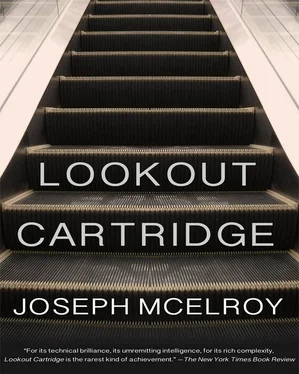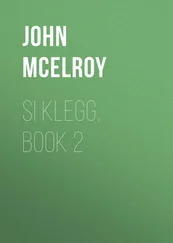Joseph McElroy - Lookout Cartridge
Здесь есть возможность читать онлайн «Joseph McElroy - Lookout Cartridge» весь текст электронной книги совершенно бесплатно (целиком полную версию без сокращений). В некоторых случаях можно слушать аудио, скачать через торрент в формате fb2 и присутствует краткое содержание. Год выпуска: 2014, ISBN: 2014, Издательство: Dzanc Books, Жанр: Современная проза, на английском языке. Описание произведения, (предисловие) а так же отзывы посетителей доступны на портале библиотеки ЛибКат.
- Название:Lookout Cartridge
- Автор:
- Издательство:Dzanc Books
- Жанр:
- Год:2014
- ISBN:9781941088036
- Рейтинг книги:3 / 5. Голосов: 1
-
Избранное:Добавить в избранное
- Отзывы:
-
Ваша оценка:
- 60
- 1
- 2
- 3
- 4
- 5
Lookout Cartridge: краткое содержание, описание и аннотация
Предлагаем к чтению аннотацию, описание, краткое содержание или предисловие (зависит от того, что написал сам автор книги «Lookout Cartridge»). Если вы не нашли необходимую информацию о книге — напишите в комментариях, мы постараемся отыскать её.
Lookout Cartridge — читать онлайн бесплатно полную книгу (весь текст) целиком
Ниже представлен текст книги, разбитый по страницам. Система сохранения места последней прочитанной страницы, позволяет с удобством читать онлайн бесплатно книгу «Lookout Cartridge», без необходимости каждый раз заново искать на чём Вы остановились. Поставьте закладку, и сможете в любой момент перейти на страницу, на которой закончили чтение.
Интервал:
Закладка:
What wouldn’t I believe? I said.
The man on the floor began panting.
He said, I’m blind without glasses.
He panted and stopped as if he might die. He said, Go?
I thought I had done something to him.
I asked what Aut had expected to find Thursday, but my host said all he knew was what I knew he knew and he was an artist and all this up here had nothing to do with — Aut — at last he had said the word the way I’d wanted. I did not approach him because the issue of my friend Sub and his kids’ toys was over, and a new fight would be my host now in the right defending his real work. Whatever he knew about the Corsican Montage or the Unplaced Room, he wasn’t about to tell me if his slit-scan contraption had anything to do with Outer Film, so I didn’t try anything like, say, asking if he used a selsyn drive to shift panels of painted glass behind the screen slit — he must have been playing about with something behind the slit for the oncoming camera to take. I had again this strong sense that the slit-scan wasn’t Aut’s business.
What wouldn’t I believe? I said.
There were steps rising and the man in glasses got himself to his feet.
Answer me, I said.
He stared at my chest so idly the continuing steps seemed to stop rising: Expanded real-time projection, he said, directly mind through console.
But indicating the door he said, Don’t tell him about this, he’s crazy.
A selsyn is a sort of analog computer in that it transfers angular rotation from one power source to another.
About what? I said.
Oh he’s crazy, the man in glasses said.
Well he’s not a god, I said.
It occurred to me I hadn’t been in a fight since before I grew my beard. Now three years later as the big metal door scraped and for a second wouldn’t open, I had less feeling than I should have had about Sub’s being inconvenienced or Tris and Ruby’s things being upset. And this touch of new weightlessness I’d experienced climbing the stairs was not opposite to but in collaboration with the straightening effect my elegant raincoat had connecting my shoulders and biceps and chest.
But crazy how? I said. Hell, you might be crazy too — you go around impersonating a guy named Graf.
The door came open and Jerry the fifteen-year-old-looking child with the lush shimmering hair raised his hand to me Hi, and went to the electric ring. He turned as if thinking again, and stared at his friend, and said, You might save a tea bag.
I might.
I do pay the rent.
Lucky I let you, said the man in glasses.
Jerry contemplated me.
Graf I heard?
He poured water on his friend’s tea bag.
I said, You know a Graf?
Jerry stabbed color from the bag. The question, he said, is do you know a Graf?
I smiled parentally. I tried something; I said, Yes, a painter Jan Graf.
Jerry turned to me and stood straight on two feet, shoulders back, teacup held like a host. What had I seen and where?
I said I was quite, well, familiar with her, her current work at a London gallery; her abstracts were very interesting especially of faces; I said I couldn’t think of anything else really to say, I didn’t know how to talk about painting but I saw some and I liked Jan Graf what I’d seen of her.
Jan Graf herself? he asked.
I smiled I think and said I’d come in contact only with her work.
Jerry was like a boy I knew in school, less head and more hair. A private school in Brooklyn, what is called in England a public school. You never knew what thing you said would drive him mad with an insanity. And what happened then was quite exciting though sometimes tiresome. He would seem with his attention to whip in close to you and like a word in some elaborate memory system the numerical address so to speak of what you’d said was lighting up a new mile of gates and circuits, functions and paths, loops and levels, though in those days during the war when we didn’t know about computers, I must have thought this reaction in him was more like the pneumatic message-capsules that flew through the tubes at some New York department store my mother had a charge at. Yet no — for to think of these, I’d have had to think of computers first.
I asked if Jerry knew this painter. He smiled at the man in glasses, and without once looking at me said, I know her work, she’s a beautiful artist, the real thing not some prostitute hack.
He was excited drinking his tea.
I said I was interested in buying one of her pictures, and Jerry was so quick to say which one, that I said, A sort of abstract woman with white hair.
Jerry turned suddenly to the man in glasses and said, Where’s June?
I said, Your friend can pick ’em.
His trick, said Jerry, is he doesn’t make it with them and so they keep coming back for more nothing.
Just that one time, said John as if pretending to care.
Jerry asked when I’d seen that portrait with the hair.
I said I had to go, and he said he had me mixed up with someone else, and as I was pulling the door to behind me I thought I heard the man in glasses say, No you don’t, and Jerry say, Watch it, John.
I was sorry to have had a fight with John, the man in glasses, because I knew Jerry knew Jan Graf. But after the fight — which I’d asked John to pass on to Aut — I believed I would now hear from Aut.
I was in New York, wasn’t I?
In London I could have phoned Jan Graf Aut and gone to see her. She might well be estranged from her husband if she lived there. Wasn’t not going directly to her like not going directly to Aut’s office, or was it like not telling Lorna what the film was about last night London time?
Jerry felt something about June. What? She was taller. He’d named her in that precipitate way he had that reminded me of my classmate Ned Noble. I didn’t want to go back, only ahead.
I had almost lost that sensation on the stairs before of happening into a new stage.
I went to the bank, I took the subway to Wall and walked up that deep aisle named for the wall built by their governor for the Dutch against the Indians but soon taken down plank by plank to house and heat themselves. Straight old Trinity Church rises at the head if you go that far where Broadway ends Wall, but just past the legendary bank where in 1920 the bombers missed their target J. P. Morgan and exploded instead thirty-eight lunchtime strollers who happened to be near the crucial cart. I turned left down Broad and visited the Stock Exchange where I picked up some disappointing literature for Will and stood in the visitors’ gallery watching shirt-sleeved men on the floor drop ashes into their telephones.
I came down around along Broad past Fraunces Tavern where our American history teacher, a Son of the Revolution, met some of us for lunch the spring he retired and told us its first owner, Black Sam Francis, a French West Indian Negro, became Washington’s steward in the first presidential mansion in New York, and was going on about Black Sam’s daughter Phoebe who saved the Father of his Country from a bodyguard’s poison, when Ned Noble who’d been brought here for lunch more than once by his father who was a broker interrupted to say that Washington had left his hat here, and we all laughed and later found it was true.
I had Will’s literature in a big envelope and I wanted to put it somewhere. I was cutting back on Water Street to Wall and the subway.
Sight unseen, Will wrote a school essay about James Hamlet, whom I’d never heard of, who in 1850 worked for a Water Street firm right by the East River near the junction with Old Slip, and that autumn he was kidnapped to Baltimore under the Fugitive Slave Act and it stood up before the Commissioner who perhaps because of the federal fee of ten dollars was willing to believe that black James Hamlet belonged to Mary Brown. I asked Will to tell all this to Dudley Allott, who was a historian, and Will did.
Читать дальшеИнтервал:
Закладка:
Похожие книги на «Lookout Cartridge»
Представляем Вашему вниманию похожие книги на «Lookout Cartridge» списком для выбора. Мы отобрали схожую по названию и смыслу литературу в надежде предоставить читателям больше вариантов отыскать новые, интересные, ещё непрочитанные произведения.
Обсуждение, отзывы о книге «Lookout Cartridge» и просто собственные мнения читателей. Оставьте ваши комментарии, напишите, что Вы думаете о произведении, его смысле или главных героях. Укажите что конкретно понравилось, а что нет, и почему Вы так считаете.












